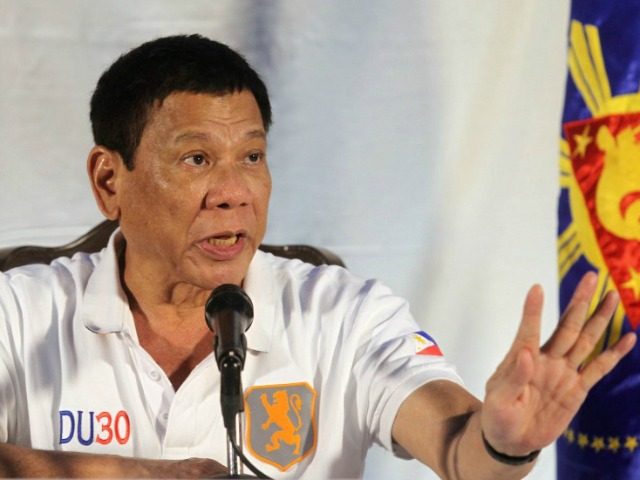Philippine Foreign Secretary Perfecto Yasay confirmed this week that Manila had sent Beijing a formal protest about the development of military infrastructure in the South China Sea, where China has invested heavily in colonizing sovereign Philippine territory.
Yasay said that his Ministry had sent a “note verbale” to China in December following the revelation that Beijing had begun to install new military assets near the Spratly Islands, which Vietnam and the Philippines share. “We have taken action on that, we have issued a note verbale,” he told CNN on Monday. Yasay reiterated the policy of President Rodrigo Duterte that the Philippines “cannot engage China in a war,” but argued that the note verbale was necessary because “when there are reports about the buildup of weapon systems in the area during our watch, we made sure that the interests and rights of the Philippines are properly protected.”
“I just want to assure the Filipino people that when we take action at engaging China in this dispute, we do not want to take such aggressive, provocative action that will not solve the problem,” he concluded.
The note verbale was a response to a report by the Center for Strategic and International Studies (CSIS) released in December, which included satellite images showing robust military buildup on artificial islands near the Spratlys and crossing into the Philippines exclusive economic zone. The CSIS images showed that China had delivered “large anti-aircraft guns and probable close-in weapons systems (CIWS)” to its illegally constructed artificial islands.
“These gun and probable CIWS emplacements show that Beijing is serious about defense of its artificial islands in case of an armed contingency in the South China Sea,” the CSIS report concluded.
In response to the report, Chinese officials claimed the anti-aircraft weaponry on the artificial islands was “mainly for civilian use,” while adding, “If someone makes a show of force at your front door, would you not ready your slingshot?”
Shortly after the release of the CSIS report, the People’s Liberation Army (PLA) stole a U.S. underwater drone exploring the waters of Subic Bay, near the Spratlys. After several days of protests from Washington, China returned the drone.
China claims most of the entire South China Sea, a $5 billion trade route that includes the sovereign territory of the Philippines, Vietnam, Brunei, Malaysia, Taiwan, and the waters off the coast of Indonesia’s Natuna Island. Most of these countries are members of the Association of Southeast Asian Nations (ASEAN), which the Philippines will chair for 2017.
Some experts believe having the Philippines at the forefront of ASEAN, after winning an international court case against China over Beijing’s encroachment in the South China Sea, will be an opportunity for Duterte to assert his country’s territorial integrity. “It would have been better if we use this opportunity to discuss it (South China Sea), to even dictate a certain code of conduct and ensure, protect the maritime integrity or the territorial integrity of our country,” Professor Dindo Manhit of the Stratbase-Adri for Strategic and International Studies told the Philippine outlet ABS-CBN.
“Hopefully, this can be a lesson that we prefer the rule of law governing us as a region and governing South China Sea,” he noted.
Duterte has been hesitant in the past to challenge China in the region, praising President Xi Jinping for investing in providing Manila with weapons and resources to combat drug crime. He recently irked Beijing by welcoming Japanese Prime Minister Shinzo Abe to his home, however, the first foreign leader to visit Duterte since he assumed the presidency.
Abe stayed in Duterte’s modest home in southern Davao City, where he served as mayor for 22 years. Abe has asserted Japan’s role in keeping the peace in the region. While Japan makes no territorial claims in the South China Sea, China has claimed Japan’s Senkaku Islands in the East China Sea, a claim Tokyo rejects.
The Chinese government has objected the chumminess between Abe and Duterte. While praising Duterte for having “committed to an independent foreign policy and developing friendly and cooperative relations with other countries,” the Foreign Ministry could not say the same of Abe.
“The Japanese leader is sparing no effort and seeking whatever means available in sowing discord,” Foreign Ministry spokeswoman Hua Chunying told reporters on Monday. “Such practice harbors ulterior motives and such mentality is extremely unhealthy.”

COMMENTS
Please let us know if you're having issues with commenting.